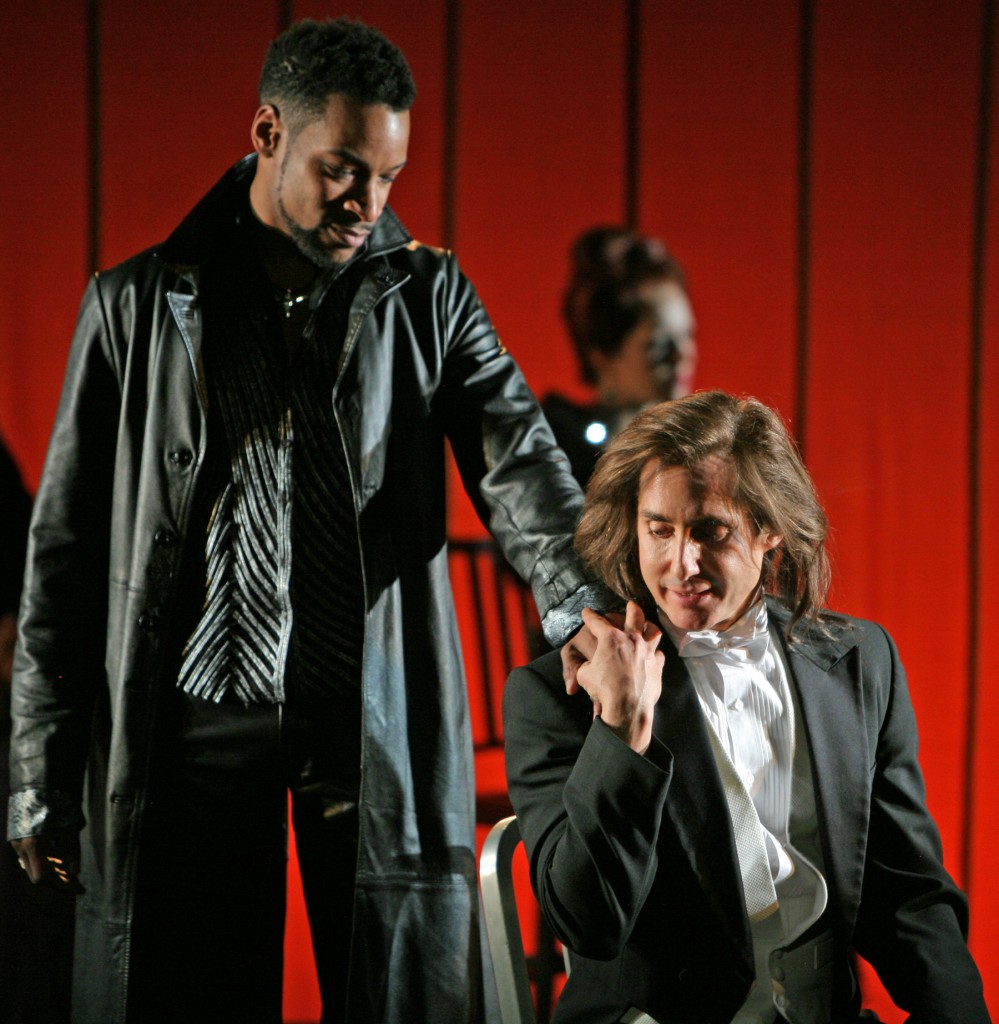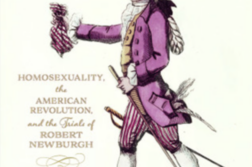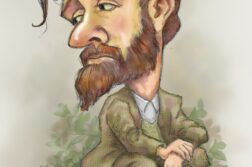AMONG THE GREAT “GAY” QUOTES is one attributed to the English dramatist-poet-spy, Christopher Marlowe (1564-1593), but it is probably apocryphal: “All they that love not tobacco and boys are fools.” Yet to stress the quotation’s unreliability-it was given in testimony by a government informer-is to miss the more important queer textual evidence in Marlowe’s remarkable Edward the Second (ca.1592), a play dealing with the 14th-century English monarch whose love for Piers Gaveston, a lowly foreigner, proves to be his undoing.
A recent New York production by Red Bull Theater, from an adaptation by the late Garland Wright, reminds us that applying any such historical anachronism as the word “gay,” either to Marlowe’s life or to his art, is a complicated business. What we find in Marlowe’s lively text and in Wright’s brisk modern adaptation—and in Red Bull’s fierce and economical production—is a world in which a version of gay cultural sensibility familiar to us has already coalesced. But

it is undeniably tempting to give Marlowe’s Edward a gay gloss for a contemporary audience. If, as in the Red Bull production, the play is set in an indeterminate sci-fi “present”—or like Derek Jarman’s visually arresting cinematic pastiche of 1991, or another current production playing in Washington, D.C., which is set in Jazz Age England (Simic, 2008)—then its central theme of the war between the intimate life of a politician and the statecraft he is expected to execute becomes bold and highly relevant foreground. It permits us to read the downfall of a James McGreevey and even a Larry Craig with fresh appreciation for both the forces arrayed against them and those warring inside of them.
Of course, there’s nothing so potentially distorting as viewing the distant past through a contemporary lens. But damn if that Piers Gaveston isn’t a bit of a scamp and a camp! His extravagant words alone put us in mind of an impetuous gay teenager who, given the opportunity, will have the man he wants on his own terms, as if he were Lord Alfred “Bosie” Douglas snaring London’s most famous playwright. Only, in Edward Piers has bagged the biggest prize, the King. Here he is at the play’s start imagining the pleasures he will install at Edward’s court now that he has been recalled from exile following the death of Edward’s father, Edward the First:
I must have wanton poets, pleasant wits,
Musicians that with touching of a string
May draw the pliant king which way I please.
Music and poetry is his delight;
Therefore I’ll have Italian masques by night,
Sweet speeches, comedies, and pleasing shows.*
Marlowe’s Gaveston imagines a “club scene” at court for himself and his lover king, encouraging both an Elizabethan reading of male love as diversionary and “loose,” and one which we can equally recognize today: it’s what 20th-century Marxist orthodoxies would have called “decadent.” Even now, the trope of homosexual theatrical frivolity is rarely far from profiles of gay life drawn by both friends and foes.
While plot reversals and geographic dislocations complicate the original text, Wright’s adaptation speeds the action of Marlowe’s play by putting several speeches into the mouths of different characters, removing explanations of the “to-ing” and “fro-ing” of the main dramatis personae, and cutting out a raft of secondary figures entirely. Thus, for example, the following lines, which map the eternal world of male-male love, is no longer said by Mortimer Senior (called “uncle” by Edward’s most determined foe, Mortimer Junior), but instead by Edward’s own brother, Edmund Earl of Kent:
The mightiest kings have had their minions:
Great Alexander loved Hephaestion,
The conquering Hercules for Hylas wept,
And for Patroclus stern Achilles drooped.
In Marlowe’s version, however, it is the elder Mortimer who takes the long philosophical view and seems momentarily to be Marlowe’s mouthpiece. Here the playwright is paying homage to the phenomenon of Greek love to which Oscar Wilde would also refer in his own defense some 300 years later. The pairs of mythical heroes mentioned here are part of the Elizabethan era’s glossary of ambivalent usages from antiquity to refer to same-sex love. In addition to this list were the sometimes pejorative “Ganymede” and the decidedly derogatory “catamite.”
Literary reference to the ancient world in Marlowe’s time is a not a simple matter, as Alan Bray minutely dissects in Homosexuality in Renaissance England, his classic study first published in 1982. Even as “Renaissance concern for classical ideals was taken” in Wilde’s era “as implying a tolerant attitude to homosexuality,” Bray argues that this had more to do with the Victorian desire for “law reform” than with the “actuality of Renaissance Europe,” where attitudes “to homosexuality had hardly changed since the thirteenth century; it was in the Renaissance … a horror, a thing to be unreservedly execrated.” Still, while elite literary forms of the period, such as poetic satires, attacked representatives of London gentry—such as a certain “young man about town, with his mistress on one arm and his ‘catamite’ on the other; he is indolent, extravagant and debauched”—court documents and census data suggest that a high percentage of youths, both male and female, were forced into positions of household servitude where sexual favors were part-and-parcel of patriarchal prerogatives.
In the Red Bull production, without Mortimer Senior to clutter the stage, it makes sense that Edward’s brother borrows Mortimer’s temperate lines invoking the Platonic ideal, establishing a canon of homosexual lovers and expressing the playwright’s brave sexual iconoclasm. Edmund Earl of Kent, after all, remains an equivocal figure in both the original text and in Wright’s adaptation. He will first defend his brother against the nobles who see Gaveston as a “wanton” and an upstart on whom their King has showered unmerited favor, including titles and lands. Later, Kent will side with the anti-Gaveston faction until Mortimer Junior reveals himself to be in league with Edward’s queen, Isabella, the former hungry for power, the latter eager to assure her son’s ascendancy. In the final analysis, Kent will rebound; filial affection and a respect for the laws that govern monarchy will return him to the family fold.
That Kent’s brotherly sentiments and his sense of duty to legal norms are at odds makes him the only figure in the play who suffers what we might call a crisis of conscience. Everyone else—the anti-Gaveston faction at court, Church representatives, and Queen Isabella herself—are too driven by self-interest to find in Gaveston’s rise anything but threats to their own status. And within the terms of the play, if perhaps not the historical record, the anti-Gavestons are traitorous to their king: they seek not only to thwart Edward’s love, but ultimately, in the sexual-power alliance of Mortimer and Isabella, to overthrow their rightful sovereign.
There are pointed indications that what offends the court nobles even more than his intimacy with the King is Gaveston’s low rank, his humble class origins. The recent New York production, directed by Jesse Berger, telegraphs class conflict by having Gaveston played by an actor of color, lithe and feline, who is immediately introduced as if he were a well-spoken street tough. The Earl of Lancaster refers to him as “base and obscure”; Mortimer Junior casts him as a “base peasant” and a “sly, inveigling Frenchman”; and even Kent, at first loyal to the King, on hearing of the various titles his brother has bestowed on his foreign minion, declares: “the least of these may well suffice/ For one of greater birth than Gaveston.” Even young Gaveston himself modestly protests: “My lord, these titles far exceed my worth.”
Class combines with “style” to mark the relationship as improper, and it counts for nothing when Edward arranges for Gaveston’s marriage to nobility, the king’s own niece. Mortimer calls Piers “swoll’n with venom of ambitious pride”—the pot calling the kettle black!—and Isabella, the Mrs. McGreevey of the scenario, justly complains that her lord, Edward, “dotes upon the love of Gaveston/ He claps his cheeks and hangs about his neck/ Smiles in his face and whispers in his ears.” But after Gaveston is recalled a second time to Court, following a scheme that Mortimer and Isabella have devised, proud and ambitious Mortimer rails that Gaveston is profligate with “the treasure of the realm” and “wears a lord’s revenue on his back.” The decidedly “hetero” Mortimer characterizes these “proud fantastic liveries” as if he were spewing venom at the latest men’s runway show in Milan:
He wears a short Italian hooded cloak,
Larded with pearl, and in his Tuscan cap
A jewel of more value than the crown.
Whiles other walk below, the king and he
From out a window laugh at such as we,
And flout our train, and jest at our attire.
Mortimer also makes the compelling case, as every flag-waving politician must, that those at court enjoy frivolous play and lavish adornment, “[w]hile soldiers mutiny for want of pay.” Here we have a familiar rap in our own time against the stereotype of “gay discretionary income” being spent on vain self-presentation, which is later joined by the nobles’ complaint that Edward is avoiding crucial matters of state. Similarly, Marlowe’s contemporary, the poet Michael Drayton, characterized a citified fellow with a “familiar butterfly [as]his page” who is dressed in “doublet and cloke with plush and velvet lined,” emphasizing the effete urban type who by the 18th century would become the “dandy.”
In Marlowe’s original, Edward also undermines the Church, an aspect Red Bull does not slight. Early in the action, the King gladly permits Gaveston revenge against the Bishop of Coventry, the “only cause” of his original exile; he encourages Gaveston to “seize upon his goods;/ Be thou lord bishop, and receive his rents/ And make him serve thee as thy chaplain.” Thus begins Marlowe’s swipe at the church. He was often thought to be an atheist or heretic, and such terms described papers, alleged to be Marlowe’s, that forced him to appear before the Privy Council ten days before his death. An informant, Richard Baines, detailed a series of shocking opinions by Marlowe that conflated religious disrespect with the worst “unnatural” acts, such as the now infamous statement that “St. John the Evangelist was bedfellow to Christ and leaned always in his bosom, that he used him as the sinners of Sodoma.”
When Marlowe was murdered in a “tavern brawl,” supposedly in a dispute over the bar bill, his murderer, Ingram Frizer, was pardoned only weeks later. It has been hypothesized that those in power preferred to sweep any nefarious plots in which Marlowe was involved under the rug. The Privy Council itself had in 1587 intervened with Cambridge to award Marlowe his masters degree despite a rumor that he was leaving England for Rheims to convert to Roman Catholicism. At the time, the Council commended the young scholar for his “good service” to the queen. The Council’s letter has since been interpreted as evidence that Marlowe worked as an agent for Her Majesty in Sir Francis Walsingham’s intelligence service.
Edward the Second, however, is strong evidence of Marlowe’s willingness to defy the existing social and spiritual assumptions of his day, which, according to Alan Bray, would have symbolically understood the sodomite as standing outside the “created order” and trailing after it “the scourges of natural disaster,” whether they be plagues or volcanic eruptions. In short, the sodomite was unholy evidence of the natural order gone wrong, a threat to life itself. Yet despite this play’s textual support for a man-loving Marlowe, and at a time when this was a thing to be “unreservedly execrated”—or lines in the opening scene of his Dido, Queen of Carthage where “dandling Ganymede upon his knee,” Marlowe’s Jupiter says, “Come, gentle Ganymede, and play with me”—some will insist on the discovery of DNA evidence to confirm a “homosexual Marlowe.” Marlowe, however, placed the evidence in plain sight: it’s in his poetry and his plays. The striking thing about Marlowe’s sex life is not that there’s no absolute proof of male lovers as that there’s no trace of female lovers.
In significant ways, Marlowe’s Edward improves upon historical facts. Gaveston was murdered some 25 years before Edward ultimately paid for his “misdeeds,” which in actuality included bungling the war against the Scots and other lapses of statecraft. The real Edward thus had ample time to find other favorites, while Marlowe’s King must quickly transfer his loyalties, if not his full affections, to young Spencer, who has the thankless task of helping him escape his pursuers but who never enjoys such pleasures as were accorded his French predecessor. Edward the Second moves at a galloping pace, and its nontraditional hero is a short-sighted sovereign who learns too late how the fortunes of a king, like those of any man, can spin around. By then, he is imprisoned in sewer water, reduced in status and privilege, and, like King Lear (only meekly), ruing his fate while accepting his downfall and certain death with hard-earned wisdom.
In a taut and rather cinematic 26 scenes, Marlowe achieves a cri de coeur from a character who, having loved against the grain, suffers the indignities of his imprisonment with honor—or at least with the honor of Marlowe’s wholly expressive language. For even stuck in “the sink wherein the filth of all the castle falls” and draped in tatters, Edward entreats Lightborne, his eventual murderer: “Tell Isabel the queen I looked not thus,/ When for her sake I ran at tilt in France,/ And there unhorsed the duke of Cleremont”—as if, remembering his youthful jousting and courting days, he might still retain his dignity. At play’s end, when Mortimer is discovered to have arranged the King’s murder, the young Prince Edward will be the instrument of his father’s revenge. Dismissive of his mother, Isabella, whose collusion is evident, the Prince offers not a word of reproach about his father’s sexual disloyalties to her: “Forbid not me to weep. He was my father,/ And had you loved him half so well as I,/ You could not bear his death thus patiently.”
It is ironic that in 1969 and ’70, on the heels of the Stonewall Riots, a British production of Edward starred the young Ian McKellen long before he had officially come out as gay. It was not a “modern” version but faithful to Marlowe. Its strong homoeroticism and climactic depiction of Edward’s demise by a hot poker up the bowels made it a landmark production. With the protean McKellen in the lead, it was revelatory—certainly to this young boy living in Brooklyn when it was later broadcast on public television. Marlowe and McKellen may not have then been “gay,” but I was beginning to know that I was.
References
Bray, Alan. Homosexuality in Renaissance England. Columbia University Press, 1995.
Romany, Frank and Robert Lindsey, eds. “The Baines Note” in Christopher Marlowe: The Complete Plays. Penguin Books, 2003.
Simic, Charles. “The Muses’ Darling,” in The New York Review of Books, January 17, 2008.




